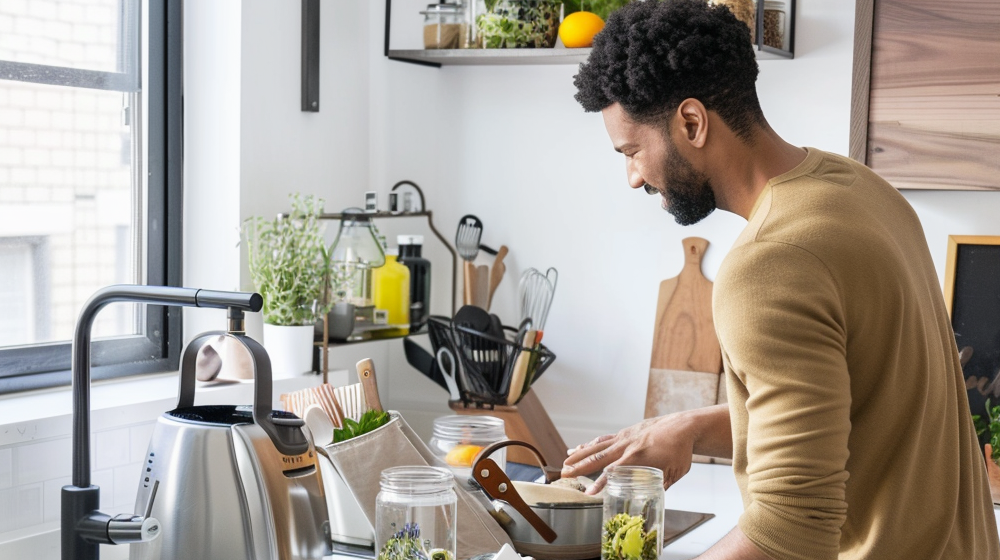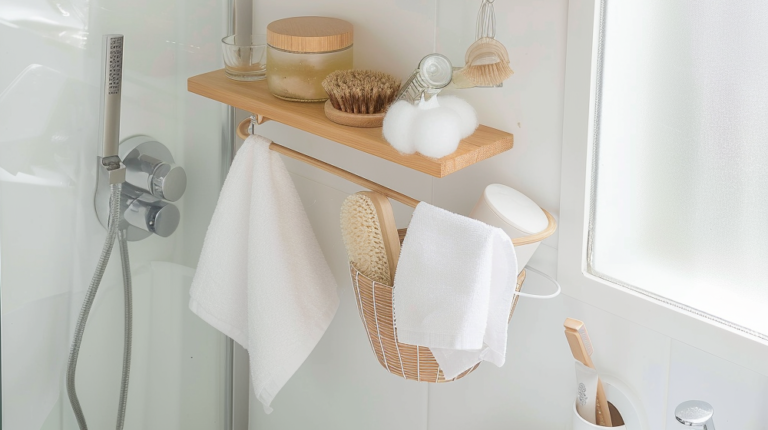Developing an Eco-Friendly Kitchen That Is Rentable
For most households, the kitchen is the most wasteful room because of food packaging, energy-consuming gadgets, and disposable conveniences. Converting this area into a sustainability hub poses special difficulties for environmentally conscientious tenants, especially given landlord limitations on alterations. However, you can still build an eco-friendly kitchen regardless of your rental status by making a number of significant adjustments without changing permanent fixtures.
Beyond Recycling: Advanced Reduction of Waste
Recycling is vital; however, there are more environmental advantages to preventing trash production:
Systems for Free Shopping with No Packaging
- When shopping at bulk food stores, bring your own containers
- Use reusable produce bags rather than plastic ones
- Keep food in glass jars rather than its original packing
- Look for local markets with low packaging needs
Solutions for Composting That Are Rental Friendly
- Activated charcoal filters in countertop collectors get rid of smells
- Freezer composting techniques avoid bug and odor issues
- In sealed containers, Bokashi systems ferment food waste
- Drop-off schemes for processed compost in community gardens
The smooth inside surface of the OXO Good Grips Compost Bin makes it simple to empty and clean by preventing food and liquids from sticking. In small rental kitchens, its modest size allows it to fit under sinks or on countertops, and its cover with removable carbon filters effectively blocks out aromas.
Techniques for Energy-Efficient Cooking
Your kitchen’s carbon footprint is greatly impacted by your cooking methods:
Choosing Appliances Strategically
- Replace several appliances with multipurpose devices
- Choose countertop induction cookers over traditional electric burners
- Toaster ovens versus large ovens: Choose the right size equipment for smaller meals
- Invest in pressure cookers to cut down on cooking time
Ingenious Cooking Techniques
- Cook several meals at once to save energy each meal
- Cover pots to retain heat and expedite cooking
- Use leftover heat by shutting off electric burners before food is done
- Match pot and burner sizes for optimal efficiency
Water Conservation: Going Beyond the Fundamentals
Water use in kitchens goes beyond the obvious:
Advanced Techniques for Dishwashing
- Use water-efficient washing bowls for hand washing
- Stop pre-rinsing dishes and scrape instead
- Run dishwashers only when fully filled
- Collect rinse water for plant irrigation
Unseen Water Savings
- Store drinking water in the refrigerator rather than running the faucet
- Steam veggies rather than boil them whenever feasible
- Reuse pasta water for soups or for watering plants
- Wash fruits and vegetables in a basin rather than under running water
Sustainable Storage Options
Food should be stored properly to save waste and take rental restrictions into account.
System of Organization
- Utilize transparent containers to keep leftovers visible
- Create special “eat soon” sections in refrigerators
- Label with purchase or preparation dates
- Implement FIFO (First In, First Out) rotation systems
Preservation Methods
- Learn how to pickle produce in the refrigerator to prolong its shelf life
- Look into freezing seasonal foods
- Investigate conventional food preservation methods such as salt curing or oil packing
- Use ice water baths to revive almost-wilted produce
Assessment of Small Appliances
Not all upgrades to the eco-kitchen need to be installed permanently:
Additions with Low Energy Use
- Solar ovens are ideal for sunny balconies or windowsills
- Slow cookers use little electricity for lengthy cooking times
- Electric kettles use less energy than stovetop water heating
- Microwave cooking uses a lot less energy than traditional ovens
Superfluous Energy Wastage
- Single-use devices that replicate fundamental tool operations
- Constantly plugged-in equipment provides standby power
- Excessive appliances for little homes
- Standby power-consuming features that you hardly use
Rentable Kitchen Equipment
In your kitchen, not everything requires a permanent place:
- Rent special occasion equipment such as large roasting pans
- Check out rarely used tools from local lending libraries
- Engage in community kitchen sharing to obtain specialized equipment
- Organize group meal preparation to divide cooking responsibilities and tools
Designing an Eco-Friendly Cleaning System
There are several opportunities to benefit the environment through kitchen cleaning:
- Reduce packaging waste by using refillable cleaning supplies
- Make the switch to biodegradable cleaning sponges and brushes
- Replace paper towels with Swedish Dishcloths Cellulose Sponge Cloths
- Prepare natural cleaning solutions in reusable spray bottles
Without making any long-term changes that could jeopardize your security deposit, you can drastically cut waste, save energy and water, and create a more ecologically conscious cooking area by putting these rental-friendly kitchen sustainability methods into practice. You may develop eco-friendly and cost-effective habits by bringing your sustainable cooking practices with you from one rental to the next with these portable methods.




